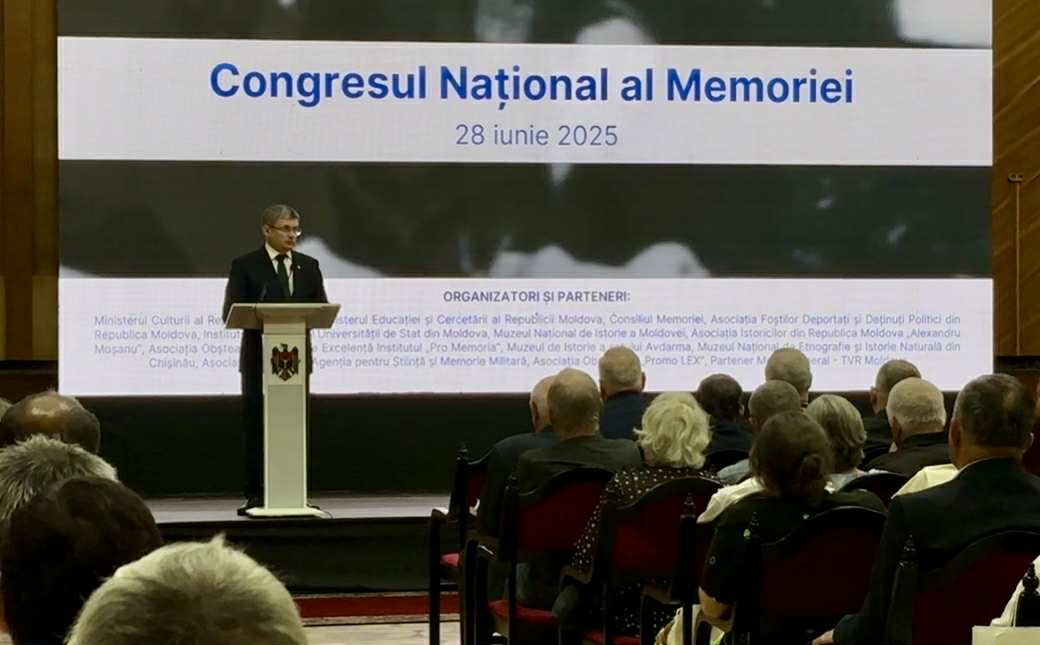
Speaker attends National Memory Congress
In every locality in the Republic of Moldova, a museum will be opened to commemorate the horrors committed by the Soviet totalitarian regime, and the authorities will complete the process of declassifying the files. Speaker Igor Grosu made the statements today. He attended the first National Memory Congress.
He opened the National Memory Congress by recalling his faculty professors who used to say: 'Those who do not know their history are doomed to repeat it.'
'History teachers urged us to think: what would have happened if the seizure of Bessarabia hadn't occurred? If there hadn't been the seizure of Bessarabia, there probably wouldn't have been deportations, organized famine, deliberately designed to destroy all that was good on this land: intellectuals, peasants, landowners. Probably, those who do not know their history are doomed to repeat it, and we see all these things through the throes of an empire from the east that cannot detach from its ambitions. I am referring to the Russian Federation, which, unfortunately, repeats those atrocities in Ukraine — an unmotivated, unjustified, and heinous war through its scale and cruelty,' declared Igor Grosu.
The official made a connection between the past, present and future, emphasizing that the Republic of Moldova is now at a crossroads, and what the citizens choose will be decisive. Igor Grosu urged all those who know the horrors of the Soviet regime to share them with growing generations so that the tragedies they endured will not recur.
'We are on the eve of historical events that will mark the path our country will take. It is very important for you, those who have suffered, who had parents who suffered, to speak as boldly and as loudly as possible about the atrocities committed and how heinous the totalitarian communist regime is that Putin is trying to extend into Ukraine and the former Soviet republics. How dangerous this regime is! The only direction for Moldova's development is European integration — a space of peace, prosperity, and respect for the memory of those who have fallen or were persecuted throughout history,' emphasized Igor Grosu.
The Speaker emphasized that living memory must be preserved, recalling his grandparents' stories about famine and deportations, told in a whisper.
The first National Memory Congress opened today in Chișinău. The event is organized by the Association of Former Deportees and Political Prisoners from Moldova, in partnership with the Ministry of Culture and the Ministry of Education and Research.
The Congress aims to become a platform for dialogue between survivors and descendants of the victims of deportations and political repressions, as well as institutional, civic, and academic actors involved in promoting historical memory.
Ungheni court cancels results of elections in central Moldova village, mandate of mayor-elect
Medical premiere: 78-year-old woman's life saved by Whipple surgery in Moldova
PHOTO Two new forests take root on banks of Dniester: green hope for Moldova's future
Moldovan civil society's warning: amendments made to industrial emissions law endanger public health, environment
Moldova to receive 30 million euros for renovating 15 model schools
Over 1,500 people affected by Chernobyl nuclear accident to get increased allowances
EBRD to allocate additional grant of 600,000 euros for solid waste project in Moldova
Experience exchange in radioactive waste management
Detentions take place in customs bribery case in Moldova
Over 100 entrepreneurs receive grants
Moldova's Supreme Court of Justice confirms decision of prosecutors' evaluation commission decision in case of Ghenadie Pirlii
Moldovan PM conveys message on Entrepreneur's Day
Diplomacy through agriculture in central Moldova village; Diplomats accredited in Chisinau pick cherries, taste traditional dishes, native wines
Financial, technical support for 15 social entrepreneurship initiatives from left bank of Dniester River
Moldovan government invests 628 million lei in roads' modernization in 132 settlements through Europe is Close programme
Student at Moldova's Stefan cel Mare Academy: teachers here are people of exceptional value
Moldovan parliament adopts Declaration in support of Ukraine; parliament speaker says parliament of Moldova stands with Ukrainian people
Moldovan president congratulates graduates of Moldovan State University's Law Faculty
President on working visit to Rîșcani district
Moldova aligns its foreign policy with international sanctions: Foreign Affairs Ministry to have decision-making authority
Moldovan state increases monthly allowances for participants Chernobyl accident relief works
Moldovan parliament approves new measures for enhancing road safety in Moldova
Romanian language teachers of Moldova to attend training courses in Romania
Moldova joins three international conventions to facilitate trade, modernize customs procedures
Moldova takes another step towards European Common Transit System


